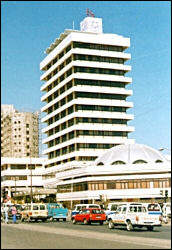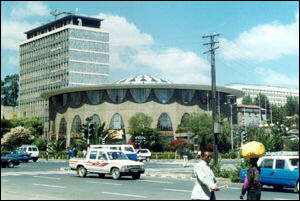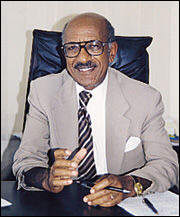 UNVEILING THE CURTAIN - FINANCE UNVEILING THE CURTAIN - FINANCE |
It is believed that Ethiopians practiced banking for several hundred years. During the Axumite Ethiopian Kingdom (from 1st century to the 7th century), it seems unimaginable that such an advanced society existed at that time with out the concept of some kinds of banking facilities.
And no one knows when and how the insurance business begun in Ethiopia. According to "Markets of the World", published by the Swiss Reinsurance Company, it is stated: "Although a systematic study of Adulis has not been completed, it has already proved that the Greek merchants reached this thriving port south of Massawa in the 1st Century. During that time it is believed that some form of Marine Insurance was used probably "General Average" along Rhodian Lines.
The practice of insurance service in its modern sense is a recent phenomenon which is said only to have been started in the early 1920s.

Prior to the beginning of the economic reform process in 1992, the Ethiopian financial sector consisted of the National Bank of Ethiopia (NBE), the Commercial Bank of Ethiopia (CBE), the Housing and Savings Bank (HSB), the Agricultural and Industrial Development Bank (AIDB) and the Ethiopian Insurance Corporation (EIC). All these formal financial institutions (as there are also informal and semi-formal institutions in Ethiopia) were state owned and operating under the planned economic system.
With the advent of the economic reform program introduced in late 1992, however, Ethiopia begun to reform its financial sector as well. Devaluation of the Birr (Ethiopian currency) and the introduction of the foreign exchange auction were some of the notable measures undertaken during 1992 and 1993. With the issuance of the Monetary and Banking Proclamation No. 83/1994, the National Bank of Ethiopia was given increased autonomy and authority to supervise the banking system.
This proclamation also laid the basis for establishing domestic private financial institutions to operate side by side with the state owned banks. Moreover, in 1995 former state owned banks and an insurance company were restructured, and some of them recapitalized. Their balance sheets were also restructured to provide for bad loans.
The HSB was restructured and renamed as Construction and Business Bank (CBB), and Agricultural and Industrial Bank as Development Bank of Ethiopia (DBE).
Pursuant to Proclamation No. 83/1994 and Proclamation on the Licensing and Supervision of Banking and Insurance Businesses, six new private banks namely Awash International Bank, Bank of Abyssinia, Dashen Bank, Nib International Bank, United Bank and Wegagen Bank were established. Similarly nine insurance companies- Awash Insurance, Global Insurance, Lion Insurance, National Insurance, Nile Insurance, Nyala Insurance and United Insurance Company - were established and they are currently operating along with the three state owned banks and the insurance corporation.
Following the liberalization process, unlike the pre-reform practice, the pattern of financial intermediation has been largely geared towards the private sector as opposed to the public and cooperative sector. The people are getting more confident of private financial enterprises through time.
Private sector participation in the financial sector has facilitated the smooth implementation of the monetary and financial intermediation through the creation of competition there by contributing to the development of the sector.
Dashen Bank, which was established in 1995 by eleven founding shareholders, is the leading private bank in its market share. Dashen's services include the service it provides door to door to corporate clients who withdraw large amount of money. The biggest business group (Midroc Ethiopia) which is owned by the tycoon Sheik Mohammed H. Al-Amoudi is a regular client of Dashen Bank.
Among the eight state and privately owned banks, many agree that 90 percent of the market share goes to the state owned banks, Commercial Bank of Ethiopia has the major market share in the finance industry. But when it comes to the private, the latest figure shows Dashen takes 5 percent of the remaining 10 percent market share in the banking industry.
 | The new economic policy has contributed to the rise of private sector market share in the banking and insurance business.
During the defunct regime, the state - owned Ethiopian Insurance Corporation has been in a position to control the insurance business by monopoly.
The new comers privately owned insurance companies have penetrated the financial market and reduced the market share of Ethiopian Insurance Corporation from 100 percent to 57 percent.
Though it is losing off its grip, it has conformed its reliability. Mr. Haile Michael Kumsa, Managing Director of the Ethiopian Insurance Corporation, says, "Since the company has a very good financial base and professional staff, new investors are actually relying more on us. For example, in six months time, we have insured three big projects; a big ring road to be built around Addis and the air port terminal for over 500 million Birr each, and also a brewery in Combolcha (a town 376 km away from Addis)".
Ethiopian Insurance Corporation has the biggest international insurance company as a partner for its reinsurance. Mr. Haile Michael says, " Our leading insurer is the Munich Reinsurnace Company of Germany, which is the largest reinsurer in the world. So, we can insure almost any risk in this country without any problem, because we have good reinsurers and a sound financial base".
The major private insurance companies, which have taken the market share competitively from EIC, are Nyala Insurance S.C., Nile Insurance S.C, Awash Insurance S.C and United Insurance Corporation.
Nyala Insurance S.C. was established in July 1997. It is a late comer and it is the 6th private insurance to be registered. However, its newness does not hinder its performance from being the leading one.

Knowing the importance of insurance service in the rural areas, Nyala Insurance widened its service coverage towards the rural areas. Mr. Nahusenay Araya states "Ethiopia has only 10-15 percent of urban population. The majority are rural population, and that is why unlike the competition we opened up seven branches in the rural area at the time we opened five in Addis Ababa".
Nyala Insurance S.C is the dominant one. Mr. Nahusenay Araya, Managing Director of Nyala Insurance S.C. says " In point of fact we are also leading all the eight private insurers, in market share, number of service centers, in the state of the art information network and office facility set ups".
The company has also reinsurer partners, who are known as leading reinsurance companies in the world. Mr. Nahusenay says "We do have very solid business relations with the first and the second biggest reinsurers in the world; Munich Re and Swiss Re, and with Royal Sun Alliance on the Engineering Insurance Area."
The government is more efficient in the implementation of favorable economic policy which is also conducive for the active participation of the private sector.
Mr. Nahusenay says " No private organization can be efficient as long as the government machinery is inefficient. If the government is efficient, the private will follow suite because the activities of the private sector are either enhanced and/or hampered by the day to day bureaucracy of the government and this is dependent on the type of people placed on the job."
United Insurance Corporation S.C. (UNIC), which is a privately owned insurance company, is performing well and it is widening its service coverage. Mr. Eyessus, UNIC's General Manager says:
" It was established at the end of 1994 as a Non-Life insurance company. By 1997, UNIC- ETHIOPIA became the first private sector insurance company to underwrite Life business as well. Having begun operations from a single office at Meskal Square in Addis Ababa, it now operates from 11 locations in Addis Ababa and the Regions. During its early establishment period there have been acute competition to which to set price even to the amount which could not cover the insurance premium. However, by challenging all these problems, UNIC is able to maintain its profitability as well as its best performance. UNIC's motos are "United and striving for excellence ", Mr Eyessus adds: " Against the recent emergence of divisive, centrifugal tendencies in the establishment of business enterprises in the country, UNIC-ETHIOPIA represents a refreshing departure. Its shareholders comprise individuals and enterprises: ordinary men and women, industrialists, professionals and business persons from all over the country. The name of the Company, "The United", was the collective choice of multi-profession and multi-ethnic investors ". UNIC-Ethiopia with many other shareholder, spearheaded the establishment of the United Bank S.C. which went operationnal in september 1998. There is no doubt that UNIC is working hard in order to put in place an appropriate infrastructure in preparation for the entry of foreign competitors into the Ethiopian insurance market.
|

